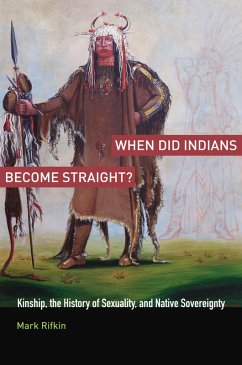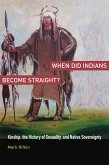When Did Indians Become Straight? explores the complex relationship between contested U.S. notions of normality and shifting forms of Native American governance and self-representation. Examining a wide range of texts (including captivity narratives, fiction, government documents, and anthropological tracts), Mark Rifkin offers a cultural and literary history of the ways Native peoples have been inserted into Euramerican discourses of sexuality and how Native intellectuals have sought to reaffirm their peoples' sovereignty and self-determination.
Dieser Download kann aus rechtlichen Gründen nur mit Rechnungsadresse in A, B, BG, CY, CZ, D, DK, EW, E, FIN, F, GR, HR, H, IRL, I, LT, L, LR, M, NL, PL, P, R, S, SLO, SK ausgeliefert werden.
Hinweis: Dieser Artikel kann nur an eine deutsche Lieferadresse ausgeliefert werden.









